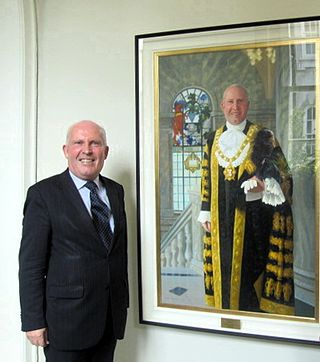Related Research Articles

The Ulster Unionist Party (UUP) is a unionist political party in Northern Ireland. The party was founded as the Ulster Unionist Council in 1905, emerging from the Irish Unionist Alliance in Ulster. Under Edward Carson, it led unionist opposition to the Irish Home Rule movement. Following the partition of Ireland, it was the governing party of Northern Ireland between 1921 and 1972. It was supported by most unionist voters throughout the conflict known as the Troubles, during which time it was often referred to as the Official Unionist Party (OUP).

Jim RodgersOBE (b.1943) is a Northern Irish unionist politician who was Lord Mayor of Belfast from 2001 to 2002, and again from 2007 to 2008. Rodgers also served as the High Sheriff of Belfast from 2016 to 2017. A member of the Ulster Unionist Party (UUP), he has been a Belfast City Councillor for the Ormiston DEA since 1993. Additionally, Rodgers is an appointed Alderman on the council.
The 1952 Belfast South by-election was held following the resignation of Ulster Unionist Party (UUP) Member of Parliament, Hugh Gage.
The 1940 Belfast East by-election was held on 8 February 1940. The by-election was held due to the elevation to the peerage of the incumbent UUP MP, Herbert Dixon. It was won by the UUP candidate Henry Peirson Harland, who was unopposed.
The 1929 Londonderry by-election was held on 29 January 1929. The by-election was held due to the appointment as High court judge of the incumbent UUP MP, Malcolm Macnaghten. It was won by the UUP candidate Ronald Deane Ross. who was unopposed.
The 1922 North Down by-election was held on 21 July 1922. The by-election was held due to the assassination of the incumbent UUP MP, Henry Wilson who had been elected in the February 1922 North Down by-election. It was won unopposed by the UUP candidate John Simms.
The 1922 North Londonderry by-election was held on 2 June 1922. The by-election was held due to the death of the incumbent UUP MP, Hugh T. Barrie. It was won by the UUP candidate Malcolm Macnaghten.
The 1922 West Down by-election was held on 17 February 1922. The by-election was held due to the appointment as Chief Clerk to the High Court of Northern Ireland of the incumbent Ulster Unionist MP, Thomas Browne Wallace. It was won by the UUP candidate Hugh Hayes.
The 1922 South Londonderry by-election was held on 18 January 1922. The by-election was held due to the death of the incumbent UUP MP, Robert Chichester who had won a by-election the previous August. It was won unopposed by the UUP candidate Sir William Hacket Pain.
The 1921 South Londonderry by-election was held on 29 August 1921. The by-election was held due to the appointment as Lord Chief Justice of Northern Ireland of the incumbent UUP MP, Denis Henry. It was won unopposed by the UUP candidate Robert Chichester.
The 1921 Mid Down by-election was held on 2 July 1921. The by-election was held due to the incumbent Ulster Unionist MP, James Craig, being elected Prime Minister of Northern Ireland. It was won by the UUP candidate Robert Sharman-Crawford.
The 1921 Mid Armagh by-election was held on 23 June 1921. The by-election was held due to the death of the incumbent Ulster Unionist MP, James Rolston Lonsdale. It was won unopposed by the UUP candidate Henry Bruce Armstrong.
The 1921 Belfast Duncairn by-election was held on 23 June 1921. The by-election was held due to the incumbent Ulster Unionist MP, Edward Carson, being appointed Lord of Appeal in Ordinary. It was won by the UUP candidate Thomas Edward McConnell, who was unopposed. The seat was abolished in 1922.
The 1921 West Down by-election to the Westminster parliament was held on 5 July 1921. The by-election was held due to the appointment as Recorder of Belfast of the incumbent UUP MP, Daniel Martin Wilson. The UUP candidate Thomas Browne Wallace was elected unopposed.
Elections to North Down Borough Council were held on 5 May 2011 on the same day as the other Northern Irish local government elections. The election used four district electoral areas to elect a total of 25 councillors.
Elections to Lisburn Borough Council were held on 7 June 2001 on the same day as the other Northern Irish local government elections. The election used five district electoral areas to elect a total of 30 councillors.
Elections to Lisburn Borough Council were held on 17 May 1989 on the same day as the other Northern Irish local government elections. The election used four district electoral areas to elect a total of 28 councillors.
Elections to Lisburn Borough Council were held on 18 May 1977 on the same day as the other Northern Irish local government elections. The election used five district electoral areas to elect a total of 23 councillors.
Elections to Newtownabbey Borough Council were held on 5 May 2011 on the same day as the other Northern Irish local government elections. The election used four district electoral areas to elect a total of 25 councillors.
Elections to Carrickfergus Borough Council were held on 5 May 2011 on the same day as the other Northern Irish local government elections. The election used three district electoral areas to elect a total of 17 councillors.